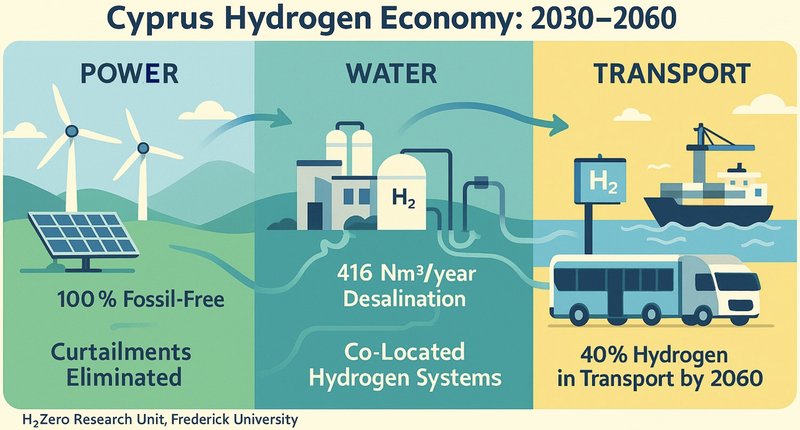Zero carbon dioxide emissions by 2060 within reach according to Frederick University study
07:45 - 25 April 2025

The H2Zero Research Unit at Frederick University has unveiled a comprehensive strategic plan for Cyprus’s transition to a fully carbon-free hydrogen economy between 2030 and 2060.
A press release says that this initiative is underpinned by a sophisticated mathematical optimization model that integrates the development of the energy, water and transport sectors, focusing on investments in renewable energy sources, hydrogen infrastructure and small modular reactors.
The study demonstrates that it is possible to achieve zero carbon dioxide emissions by 2060, while forecasting significant penetration of hydrogen in the transport sector, expected to reach 40%.
The cost of green hydrogen production is projected to decrease by 66% by 2060, while electricity surpluses will be eliminated using electrolysis units and electrical interconnections.

Small modular reactors are likely to play a critical role after 2035, supporting both the production of pink hydrogen and water desalination, while the country’s energy security is ensured through interconnection with European partners and water security through increased production of desalinated water.
According to the study, electricity generation is gradually shifting from fossil fuels to renewables and small modular reactors. Solar power increases from 800 megawatts to 7,000 megawatts, while the capacity of small modular reactors reaches 2,860 megawatts by 2060.
Hydrogen production exceeds 500,000 tons annually, with the cost of green hydrogen dropping below 2 dollars per kilogram after 2050. The average cost of hydrogen in Cyprus’s energy system is expected to settle at 1.78 dollars per kilogram by 2060.
At economic level, average annual investments reach 1 billion dollars, with cumulative savings of 38.2 billion dollars expected from reduced fuel imports and 14.6 billion dollars from avoided purchases of carbon emission allowances. The cost of vehicle ownership is expected to decrease by 3,200 dollars per vehicle annually by 2040.
Based on the simulation results, proposed policies include investments in electrolysis unit infrastructure to accelerate green hydrogen production, the gradual phase-out of fossil fuels starting in 2030 and their complete withdrawal by 2045, the potential development of small modular reactors from 2035 to provide clean baseload power.
The policies also include incentives in the transport sector to achieve 40% hydrogen penetration by 2060, as well as coordinated planning of the water-energy sector so that desalination aligns with renewable energy availability. Additionally, the development of hydrogen refueling infrastructure and the establishment of strategic export partnerships with European countries are proposed.
Overall, Cyprus’ transition to a hydrogen economy is deemed technically feasible and economically viable. The integrated approach to the energy, water, and transport sectors demonstrates how targeted investments can achieve full decarbonization, energy and water security and clean alternatives in the transport sector.
Professor of Energy Systems at Frederick University’s School of Engineering, Andreas Poullikkas, who leads the H2Zero Research Unit said that their mathematical model shows that with proper planning and timely investments, Cyprus can achieve full decarbonization without affecting its economic prosperity.

Professor Andreas Poullikkas
"Our vision is for Cyprus to export clean energy, ensure affordable and stable water supplies and advance with clean technologies, all powered by hydrogen. We invite young scientists to contribute to this effort through our research programs and doctoral studies with preferential financial support," Professor Poullikkas said.
(Source: CNA)

